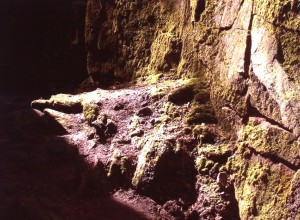Lollards
One of the many stories relating to the way that Ludchurch acquired its name is thought to stem from a man called Walter de Lud Auk, who was a Lollard, this meant that he wanted to worship God in his own way, free from the restrictions of the established church.
Walter and his followers worshipped out of doors and chose this ancient chasm to perform their religious ceremonies in. In this time gone by it would have been illegal not to attend established church services, and to perform your own church service would have been strictly illegal, this is probably why this isolated spot would have been chosen, well away from prying eyes and the authorities. Sometimes Walter and his followers would actually live in Ludchurch during the summer months using it as a base to spread their doctrines among the local people, while food would have been brought to them by Henrich Montair the Head Forester, and also a believer in Walter’s doctrines.
Though many searches were made for them, the forest was so dense in those days, and so large, that the chasm remained well concealed and undetected so they were able to continue worshiping for many years.
It was one summers afternoon when Walter and his followers were assembled in Ludchurch to perform a service, Walter, who was now seventy years old, and although white haired did not look his age, stood straight and impressive as he delivered his sermon on an elevated mound in the upper part of Ludchurch.
Walters Sermon Mound?
There were fourteen people in attendance that day, including Walter’s granddaughter Alice de Lud Auk, whose parents had died when she was an infant, and who had been raised by Walter, and often accompanied him on his religious activities. She was about eighteen years old, tall slim and attractive, and had been blessed with a beautiful singing voice. It was after a short prayer had been said, and during the first hymn that was being sung that tragedy struck, for it was during a lull in the singing and the fact that Alice continued to sing, that soldiers who were nearby were alerted to their presence. The soldiers rushed through the entrance of the chasm shouting, “Yield in the name of the blessed church, and his most gracious King Henry”. The Lollards went to seize their weapons, but stopped when commanded to do so by Walter, all obeyed with the exception of Heinrich Montair the head Forester, who was a giant of a man, he grabbed the first soldier and threw him with such force into the other soldiers that they were forced back towards the entrance.
While this was going on one of the soldiers levelled his Arquebus (gun) at the forester and fired, just missing his head, he heard a scream from behind him, and turning saw Alice in the arms of her Grandfather, dying from a bullet wound to her chest. On seeing what had happened to Alice, the forester went beserk slashing at the approaching soldiers until his attention was drawn to a low sound emanating from the chasm, it was the death chant of the Lollards, expressing their grief at the loss of one of their brethren, and after this day the songs of the Lollards would never echo against the walls of Ludchurch ever again.
Walter de Lud Auk carried his Granddaughter, and followed by the Lollards they buried Alice a few yards from the entrance to the chasm where an Oak tree now grows, after praying over her grave Walter and the other Lollards gave themselves up to the soldiers.
An Oak tree marks the possible spot of Alice’s grave.
Whilst on their way to London under guard, the forester hatched a plan for them all to escape, but Walter and his followers refused to go along with it, however Walter wanted the forester to escape and deliver important papers to France. Heinrich managed to do this and he stayed in France until the invasion by the English forces to which he joined. As to Walters followers, some were sent to prison for a while, others were pardoned, and as to what happened to Walter, it is assumed he died in prison.
Photographs by Gary Tacagni.





Not so much his own way, but in God’s way. Which has a varied dispensation, and exclusive Protestant piety. They wanted to topple the church and state for what was to later be Reformation purposes. Many Lollards were dominionist, and for a church and state relation. Others wanted to distance themselves from such institutions, in my understanding. This is the reality of Protestantism–with or without state application–that believers by rite of stewardship call the heavens upon this earthly plane to temper the World.